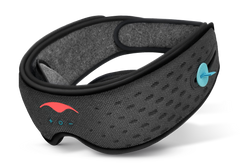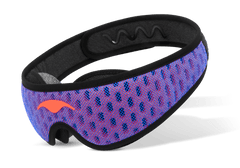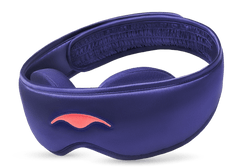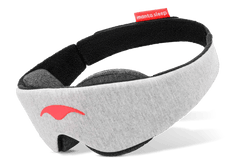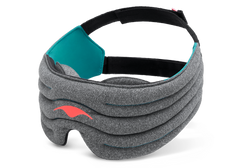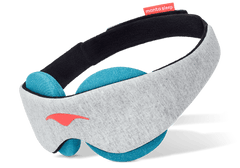Is It Safe to Use Sound Machines to Fall Asleep?
If you have trouble sleeping, you’ve probably experimented with using sound to help you sleep.
Whether you leave the fan on high all night for consistent background whirring, rely on a relaxing rain sounds app on your phone or use a dedicated sound machine, you’re far from alone.
Thousands of people use sound to fall asleep every night — and sound machines are a consistently popular option.
But despite their popularity, not everyone agrees that they’re helpful… and some doctors suggest that they may do more harm than good.
Should you use a sound machine to help you sleep? Keep reading to find out.
What Are Sound Machines?
Sound machines are electronic devices that produce a steady stream of background noise intended to help you fall asleep, in any environment, without requiring you to use your phone (and risk blue light disrupting your sleep).
Most popular sound machines emit some combination of nature sounds, white noise and/or pink noise:
- Nature Sounds include naturally-occurring outdoor sounds, like thunderstorms or croaking frogs.
- White Noise sounds like radio or TV static. It’s a consistent buzzing that doesn’t change in intensity.
- Pink Noise is a ‘muddy’ static that sounds like rushing water. Studies suggest that pink noise is more effective for sleep than white noise — and might even improve your memory (1).
Many people swear by sound machines to help them, or their babies, sleep better at night. But why, and how, do they help?
Why Does Static Help You Sleep?
Unexpected sounds can affect your sleep throughout the night.
This is because your brain registers sounds, like snoring or your cat meowing, in the middle of the night — even if you’re completely unconscious.
When your brain picks up on them, these sounds disrupt your sleep by causing you to toss and turn or shift between sleep stages (1). You likely won’t remember these disruptions the next day… but if you often feel tired and groggy, nighttime sound disruptions could be a factor.
Many people use sound machines to block out these disruptive noises very successfully.
By using a sound machine at night, you fall asleep to a consistent, low hum that you hear throughout the entire night. With white noise in the background, unexpected and inconsistent noises don't disturb you, because they’re masked by constant sound — and you get a good night’s sleep, no matter what’s going on outside your window at 4 a.m.
Unfortunately, not everyone agrees that sound machines are beneficial — and some even suggest that they may be harmful.
Read on to find out if a sound machine is a good fit for your bedroom — or if you’re better off sticking with the rain sounds app on your phone.
Can Sound Machines Harm Your Sleep?
Sound machines help many adults and newborn babies sleep better at night, and most studies agree that they’re safe (2).
So what’s the issue?
Some doctors warn that sound machines aren’t as harmless as they seem. In fact, some suggest that using sound machines for sleep can be damaging.
One doctor in Toronto studied the sound machines used in the nurseries of his hospital and determined that the devices reached sounds above 85 decibels (3).
(50 decibels is the noise level considered safe for hospital nurseries, and 85 decibels is the noise level considered safe for adults. Above 85 decibels, earplugs are recommended to prevent hearing loss.)
Does that mean you shouldn’t use a sound machine?
Not quite. Let us explain.
How to Use Sound Machines Safely
Yes, it seems scary that sound machines can produce unsafe levels of noise.
You don’t want to damage your hearing and parents definitely don’t want to hurt their baby’s ears.
So what can you do?
Use it safely. Yep, it’s that simple.
Here are 3 tips to help you use your sound machine safely:
1. Play it at a low decibel. There is no reason to play your sound machine at an unsafe decibel level. Keep it between 65-70 decibels, or the level of a soft shower. This level is harmless and can help you sleep better with zero risks of hearing damage.
2. Keep it consistent. One reason sound machines work is that they produce sound at a consistent volume. Nature noises often change, so they are not as helpful. Stick to soft white or pink noise instead.
3. Keep it soft and out of your baby’s crib. If you want to use a sound machine for your baby, play it at a level below 50 decibels. Also, keep it outside of your baby’s crib. There is no reason to risk your baby’s safety by placing the machine inside their crib.
Most doctors agree that, when used correctly, sound machines are perfectly safe.
So if you already have a sound machine, keep using it. And if you don’t have one, don’t be afraid to try one.
Add Static to Your Sleep
Thousands of people use sound machines to improve their sleep quality every single night, without risking blue light exposure by using an app on their phones.
While they can produce sounds at a high decibel level, most researchers and doctors agree that sound machines are safe and beneficial when used properly (1).
Why not add one to your sleep routine?
Sources:
(1) Stinson, Annakeara. “Is It Safe To Sleep With A Noise Machine? Your Snooze Definitely Won't Suffer & Here's Why." Elite Daily, 5 Aug. 2018, www.elitedaily.com/p/is-it-safe-to-sleep-with-a-noise-machine-your-snooze-definitely-wont-suffer-heres-why-9977176
(2) “The Bedroom Environment Listen. Are noises keeping you awake?" National Sleep Foundation, www.sleepfoundation.org/bedroom-environment/hear. Accessed 10 May 2019.
(3) Sanders, Laura. “Should you hush that white noise?” Science News, 3 Mar. 2014, www.sciencenews.org/blog/growth-curve/should-you-hush-white-noise


